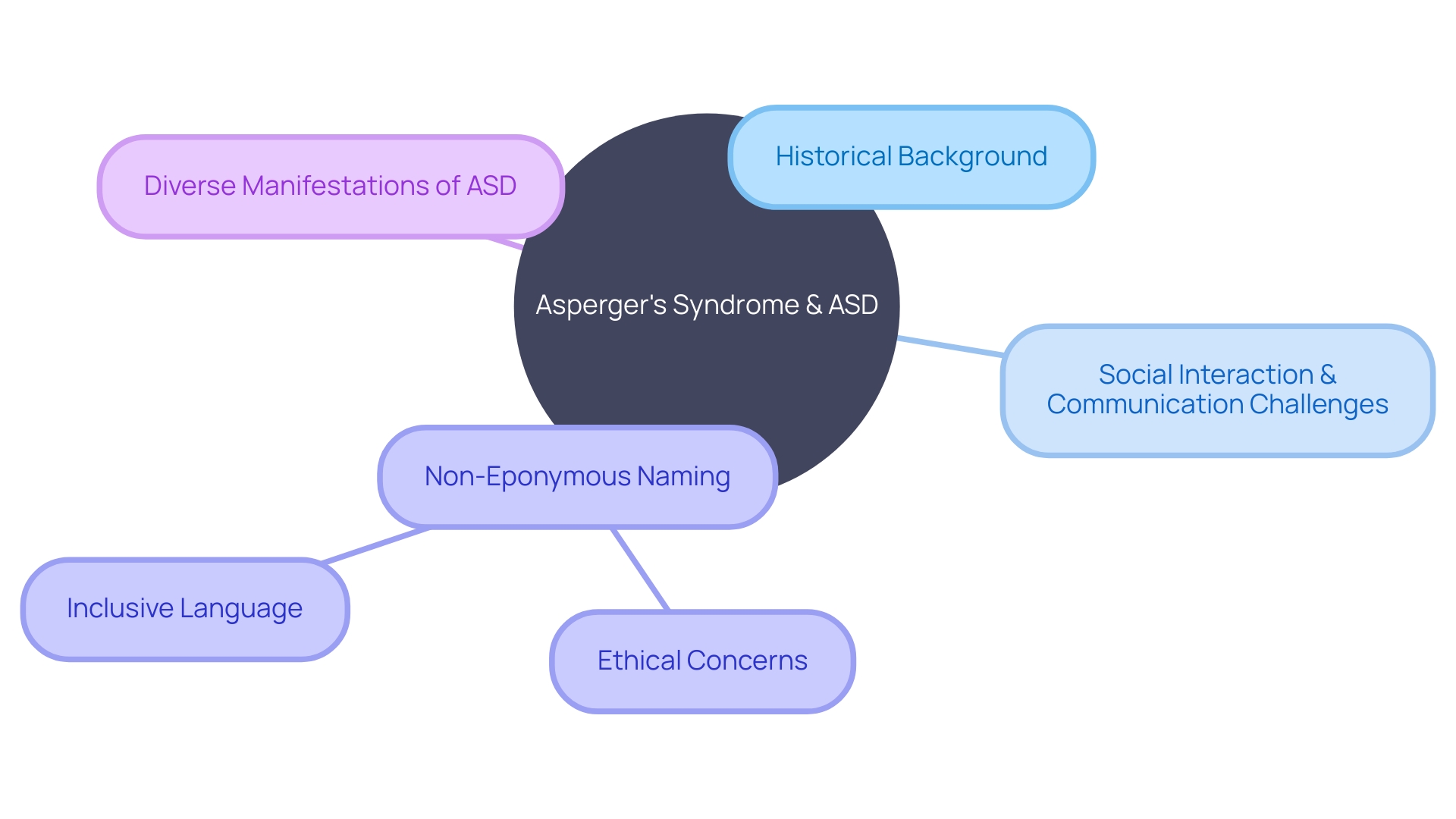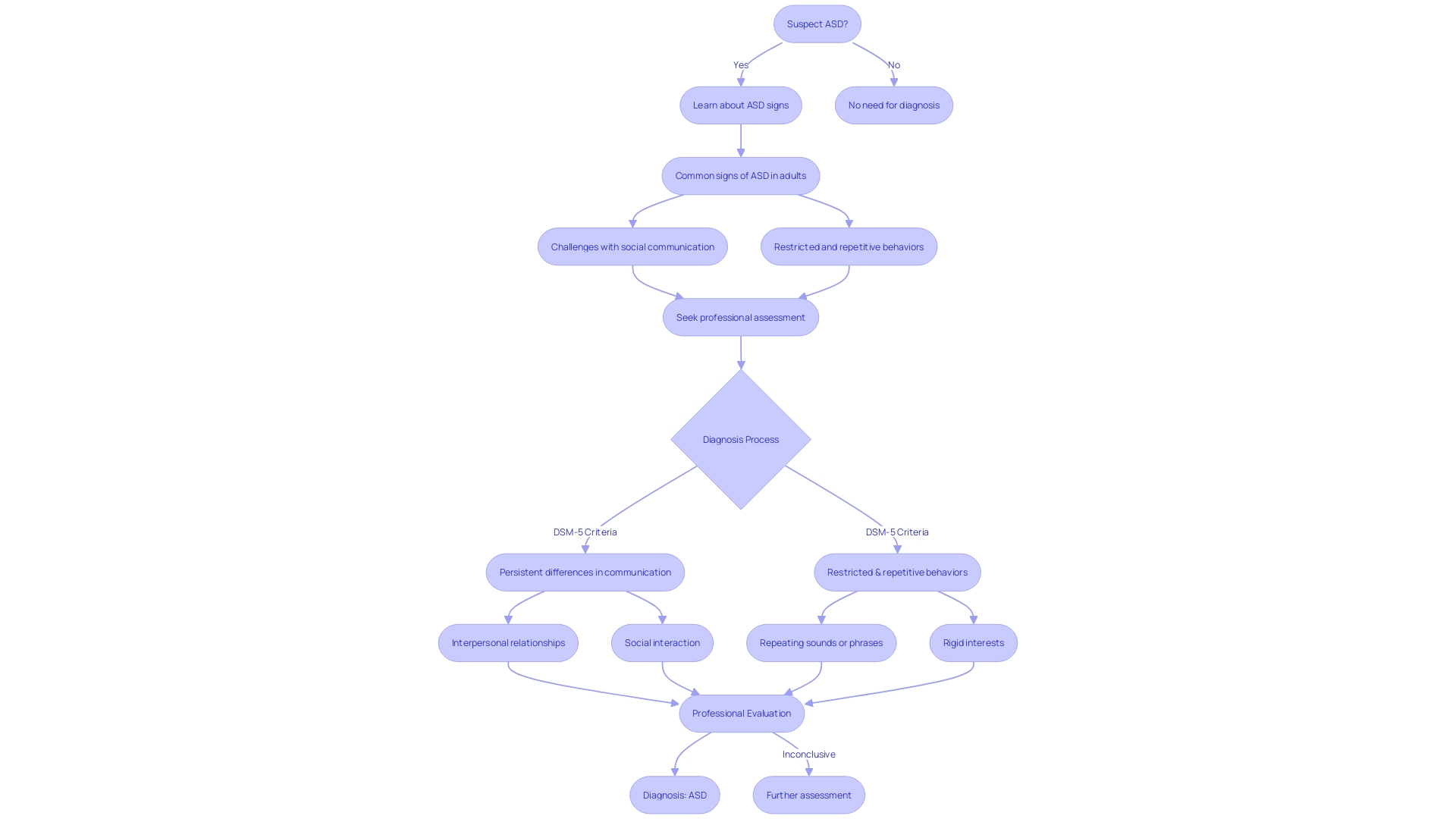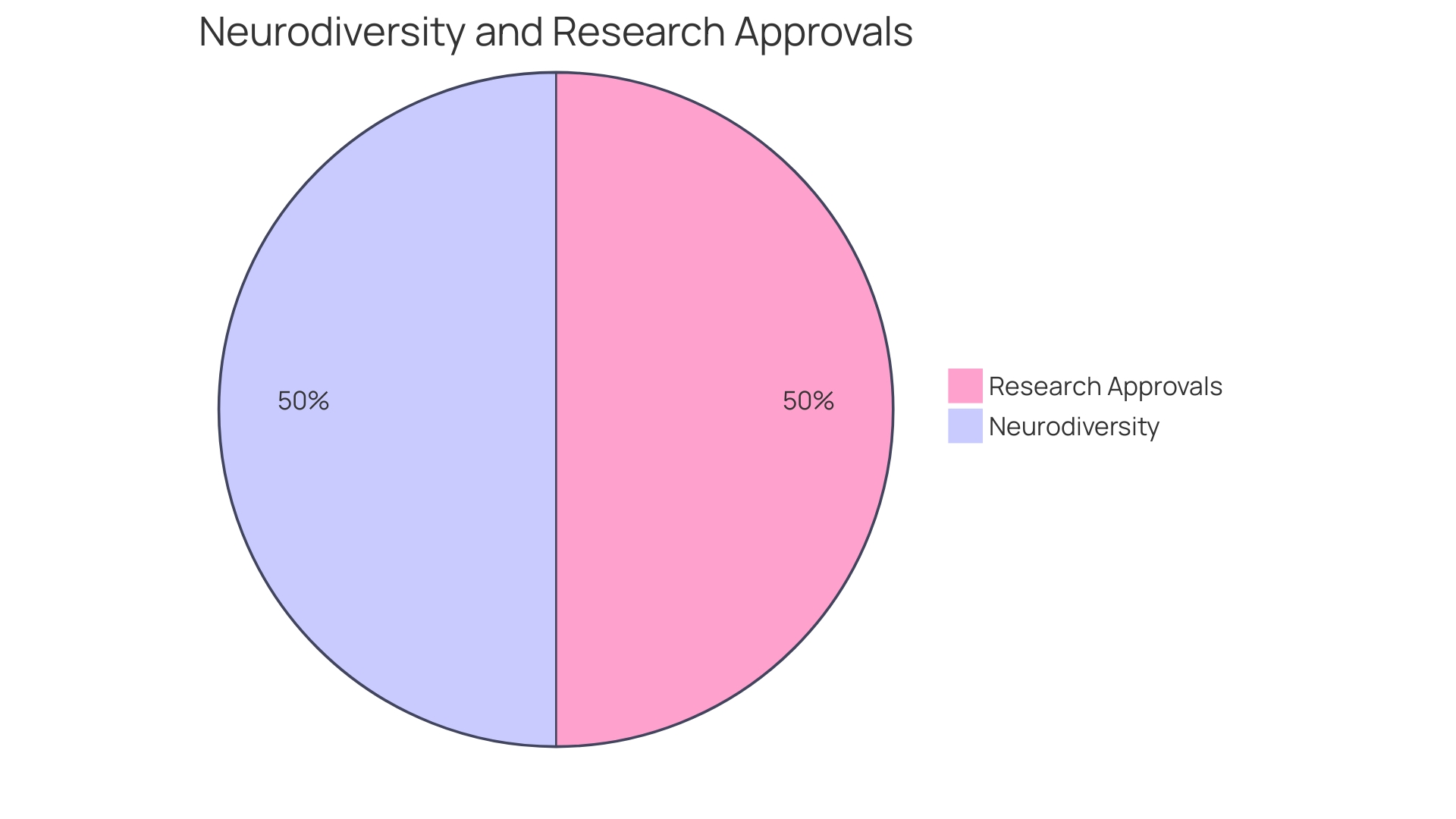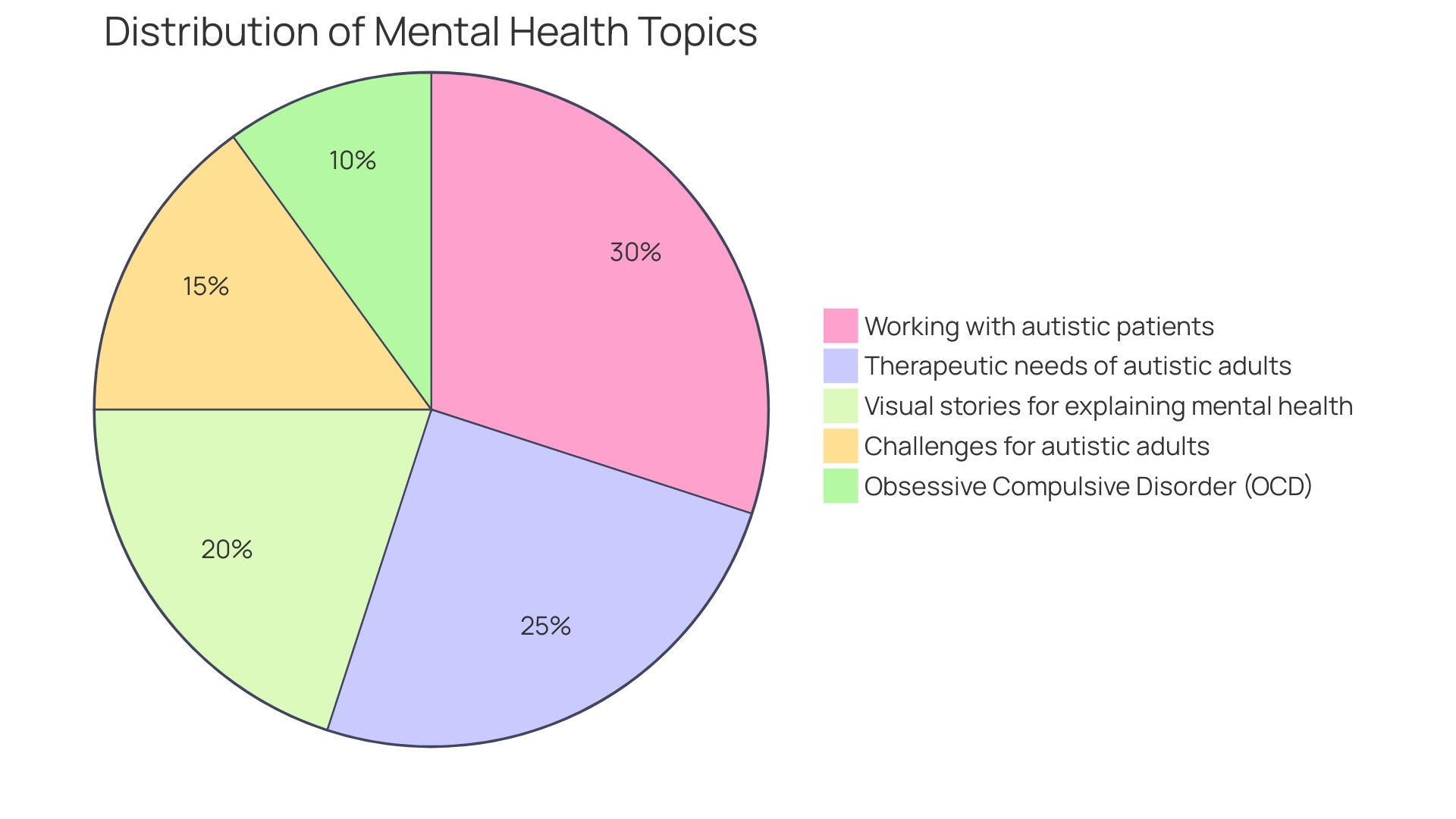Introduction
Within the broad spectrum of Autism Spectrum Disorder (ASD), there is a condition historically referred to as Asperger's Syndrome. This condition presents unique challenges in social interaction and communication, alongside restricted and repetitive behavior patterns. The term, derived from the work of Hans Asperger, who studied the disorder in the 1940s, is undergoing reconsideration.
Contemporary discussions in the medical community advocate for non-eponymous naming for conditions like Asperger's Syndrome, due to ethical concerns regarding the eponymous figures' backgrounds and the predominance of such names being attributed to white, European males. These discussions highlight the importance of understanding the ethical implications behind medical terminology and the need for inclusive and respectful language. Moreover, ASD's complexity is further elucidated by the International Classification of Diseases (ICD), which provides a standardized framework for recording and comparing health data across cultures and languages, emphasizing the diverse manifestations of ASD.
Definition and Classification
Within the broad spectrum of Autism Spectrum Disorder (ASD), there is a condition historically referred to as Asperger's Syndrome. This condition presents unique challenges in social interaction and communication, alongside restricted and repetitive behavior patterns. The term, derived from the work of Hans Asperger, who studied the disorder in the 1940s, is undergoing reconsideration.
Contemporary discussions in the medical community advocate for non-eponymous naming for conditions like Asperger's Syndrome, due to ethical concerns regarding the eponymous figures' backgrounds and the predominance of such names being attributed to white, European males. These discussions highlight the importance of understanding the ethical implications behind medical terminology and the need for inclusive and respectful language. Moreover, ASD's complexity is further elucidated by the International Classification of Diseases (ICD), which provides a standardized framework for recording and comparing health data across cultures and languages, emphasizing the diverse manifestations of ASD.

Symptoms of Asperger's Syndrome
Asperger's Syndrome, part of the broader category known as autism spectrum disorder (ASD), is marked by a mosaic of challenges and abilities. Individuals with this condition often struggle with social nuances, finding it hard to maintain eye contact, read social cues, or foster peer relationships. These social difficulties are compounded by a tendency towards repetitive behaviors and an intense passion for certain subjects, leading to a pronounced need for consistency and routine in their daily lives.
Behavioral patterns in those with Asperger's can vary widely, with some exhibiting milder symptoms and possessing high intellectual capabilities. Despite these variances, a common thread is the difficulty in processing social information, which can manifest in unique ways, from moral distress to behavioral challenges. It is essential to recognize the individuality of each person's experience with Asperger's, as their interactions with the world are uniquely shaped by the interplay between their abilities and challenges.
Recent studies have highlighted the correlation between social communication and mental health in autistic adolescents, emphasizing the profound impact that impaired social interaction can have on their well-being. The research underscores the importance of understanding the nuances of ASD and fostering an environment where the needs of those with Asperger's are met with empathy and support.
In the realm of public discourse, there is a growing movement towards using non-eponymous terms for conditions like Asperger's Syndrome to avoid the ethical dilemmas associated with historical figures and to recognize the diversity and individuality of those affected by ASD. This shift in terminology reflects a broader understanding of autism as a spectrum of conditions that impact individuals throughout their lives, necessitating a nuanced approach to each person's unique set of needs.
Social Interaction and Communication Challenges
For individuals with Asperger's Syndrome, navigating the social world can be particularly challenging. These individuals may find it hard to read nonverbal cues that most of us take for granted, such as facial expressions or body language, making social interactions perplexing. Starting and maintaining conversations, understanding the subtleties of humor or sarcasm, and grasping the unwritten rules of social etiquette can be daunting tasks.
This often leads to feelings of social exclusion and can hinder the development of deep, meaningful connections with others. Despite these challenges, it's important to recognize the strengths and potential for growth in social learning for those with Asperger's. Research indicates that, much like their neurotypical peers, autistic adults can and do benefit from engaging in social interactions, particularly when these interactions are supportive and tailored to their learning needs.
In our increasingly digital world, the expansion of online education offers new avenues for learning and connecting, illustrating that with the right social context, individuals with Asperger's can thrive. As we continue to explore and understand the complex social cognition of those with Asperger's, it becomes clear that the narrative is not solely about social struggles, but also about the remarkable ways in which they adapt to a world that is not always accommodating of their unique way of processing social information.
Restricted and Repetitive Patterns of Behavior
Asperger's Syndrome, an autism spectrum disorder, is characterized by a distinct set of behaviors that include persistent differences in communication and social interaction across various environments. Individuals with this condition often display restricted and repetitive patterns of behavior, which can take the form of an intense and highly focused interest in specific subjects, strict adherence to routines and rituals, or repetitive movements. These behaviors are not just quirks; they serve a crucial function for those with Asperger's Syndrome by providing a sense of structure and predictability, which can greatly reduce anxiety.
The nuanced nature of these behaviors reflects the complexity of the human brain and the different ways it can develop. Brain scans have revealed structural differences in individuals with autism, providing a stark contrast to neurotypical brain development. It's important to note that while these brain differences are a subject of ongoing research, misconceptions about the causes of autism—such as incorrect links to vaccines, parenting styles, or nutrition—have been debunked.
Research indicates that early diagnosis and access to resources can significantly improve the quality of life for those with Asperger's Syndrome. The Centers for Disease Control and Prevention (CDC) estimates that autism occurs in as many as 1 in 36 individuals. This underlines the importance of vigilance and early screening, which can lead to timely interventions that support individuals in navigating their unique challenges.
Recent studies, such as those conducted by The Center for Discovery, leverage artificial intelligence and machine learning to analyze complex sets of biological, behavioral, and environmental data. These studies aim to predict significant behaviors, which could lead to strategies that mitigate or prevent the impact of those behaviors on individuals with Asperger's Syndrome. For example, understanding when a certain behavior is likely to occur enables caregivers and educators to create a more supportive environment that caters to the needs of individuals with Asperger's.
Ultimately, the goal of ongoing research and intervention is to empower individuals with Asperger's Syndrome to lead full and rewarding lives, embracing their unique perspectives while also managing the challenges that come with the condition.
Diagnosis and Diagnostic Criteria
Professionals such as psychiatrists and psychologists are responsible for diagnosing Autism Spectrum Disorder (ASD), which includes what was previously known as Asperger's Syndrome. The evaluation process involves a detailed look at an individual's social communication abilities, any repetitive behaviors, and the overall development of language and cognitive skills. Unlike the previous editions of the Diagnostic and Statistical Manual of Mental Disorders (DSM), where Asperger's Syndrome was distinct, the DSM-5 has integrated it within the broader ASD category.
This shift emphasizes a spectrum of autism-related conditions, each with varying degrees of impact on a person's social interactions, communication, and behavior.
In light of recent discussions in the medical community, there's an ongoing endeavor to move away from eponymous labels like Asperger's Syndrome. Publications such as Pediatric Research are leading the charge to adopt non-eponymous alternative names for conditions, partly due to historical and ethical concerns surrounding the originators of such eponyms. This effort is also in response to the recognition that the spectrum of autism-related conditions affects a diverse population, beyond the historical demographics associated with the original names.
Furthermore, the understanding and identification of autism have evolved, with a growing acceptance of self-diagnosis within the autistic and neurodivergent community. This stems from the realization that formal medical testing can be inconclusive and may not be necessary for every individual seeking support or understanding of their experiences. The perspective on ASD has shifted from a purely medical model focused on observable symptoms to a more inclusive social model that acknowledges the internal experiences and identities of those on the spectrum.
This reflects a broader understanding that ASD is a lifelong condition, influencing not just those diagnosed with it but also their families, educators, and communities at large.

Causes and Risk Factors
Understanding the underlying causes of Asperger's Syndrome, which falls within the broader category of autism spectrum disorder (ASD), is a complex endeavor. Studies indicate that the interplay between genetics and environment is crucial in the emergence of the condition. Familial patterns suggest a hereditary component, as Asperger's Syndrome appears more frequently within certain family trees.
On the environmental side, factors such as prenatal exposure to specific substances, birth complications, or maternal medication use are being investigated for their potential influence. These insights into Asperger's Syndrome highlight the importance of considering a multitude of contributing factors rather than isolating a single cause. Ongoing research in this area is critical to developing a deeper comprehension of Asperger's Syndrome and enhancing the support for individuals affected by ASD.
Co-occurring Conditions and Complications
Asperger's Syndrome is a complex neurodevelopmental disorder that resides within the broader category of autism spectrum disorders (ASD). While individuals with Asperger's exhibit a diverse range of abilities and challenges, it is not uncommon for them to encounter additional co-occurring conditions. These may include anxiety disorders, which can manifest in severe and persistent worries; depression, characterized by significant changes in mood and behavior; attention-deficit/hyperactivity disorder (ADHD), affecting attention, impulsivity, and hyperactivity; and sensory processing difficulties, where individuals may have heightened or reduced sensitivity to sensory stimuli.
Understanding that autism and conditions like ADHD are part of neurodiversity, it's crucial to acknowledge that these are not illnesses to be cured but rather differences that should be accommodated and supported. A comprehensive evaluation by healthcare professionals is essential to identify these co-occurring conditions, enabling tailored support that addresses the unique experiences of each individual with Asperger's Syndrome. By appreciating the spectrum nature of ASD and its accompanying challenges, we can better support those with the condition in leading fulfilling lives.

Impact on Daily Life and Social Interactions
Navigating life with Asperger's Syndrome, a condition within the autism spectrum, presents unique challenges, particularly in social communication and repetitive behaviors. Despite high intellectual abilities, individuals may experience difficulties in academic and work environments, as well as in achieving independence. The complexity of their experiences includes using compensatory strategies to align with societal expectations, which often remain unrecognized.
These hidden efforts, while showcasing the adaptive capabilities of these individuals, can also lead to misconceptions and overlook their needs for support. Statistics indicate that 1 in 45 adults in the U.S. are diagnosed with ASD, highlighting the prevalence of this condition and the importance of greater societal awareness and understanding. With the right support structures, people with Asperger's have the potential to thrive, contributing to their communities in meaningful ways, while also managing the vulnerabilities associated with the condition.
Recognizing and valuing their distinct ways of processing the world is essential in fostering an environment where they can lead fulfilling lives.
Treatment and Management Strategies
Autism Spectrum Disorder (ASD) encompasses a range of developmental conditions marked by challenges in social interaction, communication, and behavior. While there is no cure for what has been known as Asperger's Syndrome, now more accurately referred to within the broader category of ASD, the right support and early intervention can lead to significantly improved outcomes. Tailored treatment plans often include a combination of behavioral therapies, speech and language therapy, social skills development, and occupational therapy.
Moreover, customized educational plans and workplace accommodations are instrumental in helping individuals thrive academically and professionally.
Understanding the unique strengths of each individual with ASD is crucial for establishing trust and providing effective support. For example, therapies for common conditions like anxiety and depression in autistic adults may not differ substantially from the general population. However, the therapeutic approach should be adapted to meet their specific needs, emphasizing the importance of inclusivity in treatment practices.
As research continues to evolve, it's vital to stay abreast of the latest findings, such as recent insights from the ICD-11 classification on mental health diagnoses, which can influence the management of ASD. By integrating evidence-based research with a compassionate understanding of each person's abilities and challenges, caregivers and practitioners can make a significant difference in the lives of those with ASD.
Prognosis and Long-term Outcomes
The future for those diagnosed with autism spectrum disorder, historically referred to as Asperger's Syndrome, is not uniform. Tailored support and therapeutic strategies can significantly impact the level of independence and quality of life for individuals. While some may continue to face challenges in social communication and executive functions, the provision of continuous education and resources can improve long-term outcomes.
It is crucial to acknowledge the evolving language and understanding of autism, as highlighted by Pediatric Research's commitment to using non-eponymous terms for conditions, reflecting both ethical considerations and inclusivity.
Autism spectrum disorder encompasses a diverse set of conditions, affecting people's behavior, social interactions, and communication skills in varying degrees. Understanding and supporting someone with autism requires a deep appreciation of these differences and their lifelong persistence. The Interagency Autism Coordinating Committee (IACC) plays a pivotal role in enhancing federal coordination and communication, advising on research and services to better serve the needs of the autism community.
This collaborative effort underscores the importance of partnerships between government agencies, autistic individuals, family members, and stakeholders to foster understanding and effective support measures.
Support and Resources for Individuals and Families
Support for those with Asperger's Syndrome extends beyond the basics of healthcare and education; it encompasses a network of resources tailored to enhance quality of life for individuals and their families. This support ranges from support groups that offer a shared space for understanding and camaraderie, to advocacy organizations that champion the rights and needs of the autistic community. Educational resources provide insights into the condition, assisting families and individuals in navigating the complexities of Asperger's Syndrome, while therapeutic services address the diverse behavioral, occupational, and speech therapies that can significantly improve daily life.
According to Dr. Gregory Wallace from The George Washington University, despite a growing body of research focused on children and teenagers with autism, there is a substantial gap in understanding the adult years of autistic individuals. This highlights the importance of lifelong learning and support. For instance, Laura McKenna, PhD, organizes webinars to equip parents with the latest information on supportive programs, recognizing that high school guidance counselors may not be fully aware of all the options available.
The 2022 Report to Congress by the U.S. Department of Health and Human Services emphasizes the necessity of supportive services, including those now mandatory under Medicaid due to recent changes. This broadens the accessibility of vital therapies for individuals with autism. Furthermore, the NAMI HelpLine offers a peer-support service that's vital in connecting people to appropriate resources and information.
Parent and advocate Kate Swenson's reflections on her family's journey underscore the emotional impact and the transformative support needed from professionals. It's a testament to the community's role in assisting families to adapt and thrive. Additionally, the Kevin and Avonte Program exemplifies a targeted approach to prevent wandering, a serious concern for many with autism.
Statistics reveal that over 21% of Americans have been caregivers in the past year, which is an increase from previous years, underscoring the growing need for support networks. As families and friends form the backbone of caregiving, the collective effort to provide care is a testament to the strength and resilience of our society. The expanding web of support for those with Asperger's Syndrome is not just about immediate needs but also about ensuring a fulfilling and dignified life for all involved.

Conclusion
In conclusion, Asperger's Syndrome, a condition within Autism Spectrum Disorder (ASD), presents unique challenges in social interaction, communication, and restricted behavior patterns. The medical community advocates for inclusive language, moving away from eponymous labels like Asperger's Syndrome. The International Classification of Diseases (ICD) provides a standardized framework for understanding the diverse manifestations of ASD.
Individuals with Asperger's Syndrome struggle with social nuances, making it difficult to form relationships. However, recognizing their individuality and potential for growth in social learning is crucial.
Navigating the social world is challenging for individuals with Asperger's Syndrome, but with support, they can thrive. Online education offers new opportunities for learning and connection.
Early diagnosis and access to resources improve the quality of life for those with Asperger's Syndrome. Ongoing research uses artificial intelligence to predict behaviors and develop strategies to mitigate their impact.
Moving away from eponymous labels reflects ethical concerns and recognizes the diverse population affected by ASD. The understanding of ASD has evolved to include self-diagnosis and a more inclusive social model.
Living with Asperger's Syndrome presents challenges in communication and executive functions. Valuing the unique ways individuals with Asperger's process the world is crucial.
While there is no cure for ASD, support and early intervention improve outcomes. Tailored treatment plans and accommodations help individuals thrive academically and professionally.
Greater societal awareness and understanding are essential. Collaboration between government agencies, autistic individuals, families, and stakeholders fosters effective support measures.
In conclusion, embracing the perspectives and needs of individuals with Asperger's Syndrome creates an inclusive society. Together, we can ensure that those with Asperger's and ASD thrive and contribute meaningfully.




